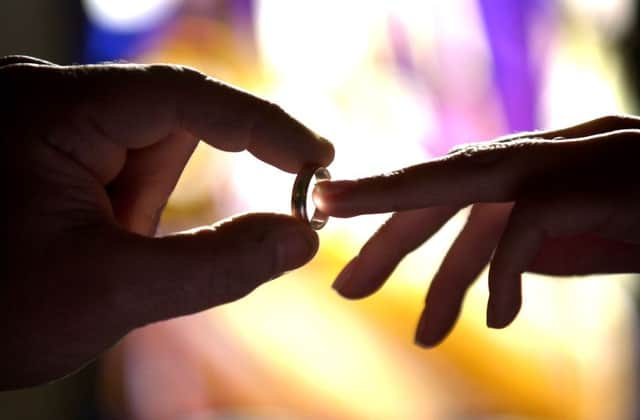Peter Shand: Tax law and marriage go together like a horse and carriage


To the horror of unrelenting romantics, dancer Wayne Sleep recently admitted to having married to avoid paying inheritance tax.
As a practical lawyer-type, I couldn’t possibly comment on the implications of Sleep’s revelations, however I can only commend the prudent tax advice which he received in relation to tying the knot. Indeed, “for better or worse”, successive governments in the UK and beyond have consistently endorsed the institution of marriage (and civil partnership) through tax regimes. Thus, for the meantime at least, tax law and marriage do go together like a horse and carriage.
Advertisement
Hide AdAdvertisement
Hide AdSo how can happily married couples make the most of their romantic and financial statuses?
The most important thing to remember when it comes to tax and love affairs is that, whilst in marriage what’s mine is yours, in tax law, what’s yours is yours. Thus, as far as tax law is concerned, each person is an island and therefore individually receives the same tax allowances to which they would be entitled if they were legally single. Such allowances apply in the areas of inheritance tax (IHT), capital gains tax (CGT), individual savings accounts (ISAs) and income tax. Not wishing to meddle in the age-old principles of marriage or the highly human endeavour of love, however, tax law recognises that where two people join together in matrimonial union, so too do their tax allowances. How romantic!
At present, IHT is payable at 40 per cent on estates over £325,000 and, from next year, anadditional nil rate band of £100,000 (increasing by £25,000 for each of the three subsequent years) will be introduced to cover principal private residences. For married couples who enjoy the right to transfer their IHT allowance to their spouse on death, however, as Sleep’s comments allude to, the IHT savings permitted by this allowance will be double those of legally single people, exempting up to £1million by 2020 (but, notably, the allowances will gradually reduce on estates worth over £2million).
A similar concept exists as regards CGT. Take married couple, Mr and Mrs A. Mrs A intends to sell a capital asset which will be subject to CGT. If Mrs A is a higher rate taxpayer, she will be liable to pay CGT at 28 per cent on any capital gains she makes which exceed her £11,100 annual exemption. Where Mr A is a basic rate taxpayer, however, Mrs A could transfer the asset to him without crystallising a capital gain. Mr A can then make the disposal to a third party outwith the marriage and, as a basic rate tax payer, be liable to pay only 18 per cent on any gains over his annual exemption.
Similarly, if Mrs A were likely to exceed her annual ISA allowance, she could transfer the additional balance of the money she intends to invest to Mr A and, assuming Mr A has not used all his allowance, ensure further tax-free savings.
If Mr A had not used all of his personal allowance (the first chunk of one’s income which is taxed at 0%) and Mrs A was a basic rate taxpayer, the pair could also take advantage of newly-revamped “marriage allowance” (introduced by the coalition government from April this year but, interestingly, opposed by Labour and the SNP). They would do so by Mr A transferring up to £1,060 of his £10,600 personal allowance to Mrs A, thereby increasing Mrs A’s personal allowance to £11,660. This would reduce the amount of Mrs A’s income being taxed and save the couple up to £212 per year.
Therefore, while romantics may recoil at the thought of marrying for money rather than love, it is worth recognising that, for the time being at least, marriage is as much a financial partnership as it is a romantic one.
• Peter Shand is a Partner with Murray Beith Murray www.murraybeith.co.uk